In 2024, our lives are saturated with marketing and advertising messages. We’re more skeptical and less receptive to traditional advertising than ever before.
So, how do you break through those barriers and reach your customers? How do you garner trust and credibility?
The answer is referral marketing! People trust people – in a noisy, digital world, word of mouth and peer-to-peer referrals are still the best way to reach the right people.
Studies have shown that that 90% of people trust recommendations made by friends or family, whereas 75% don’t trust traditional advertisements.
Referral marketing is also one of the most cost-effective options and offers additional value in that it works to both retain and re-engage existing customers, as well as generate new ones!
In this guide – we give you all the information and tools you need to create a successful referral marketing program today!
Referral marketing is when customers refer their friends or family to a business through word of mouth, rather than the business using traditional advertising to attract customers.
A referral program is a systematic reward system, based on your referral marketing strategy, that offers your customers an incentive to recommend you to people they know.
These incentives come in different forms, ranging from discounts on subsequent purchases to free cash or other benefits.
Referral programs serve two main purposes:
1. They keep your existing customers engaged, help you develop lasting and meaningful relationships. This increases customer lifetime value and your long-term revenue.
2. They bring in new, qualified, leads that are more likely to convert due to improved trust from a referral. These customers can then join the referral program too and keep coming back for the benefits and incentives.
Referral marketing programs offer great benefits, including:
– Precise Targeting – your existing customers are already part of your target audiences
– Improved Trust and Credibility – referrals and reviews are trusted by peers
– Higher Customer Retention – keeping customers engaged and rewarding them fosters loyalty
– Customer Lifetime Value – loyal customers that have a long relationship with a brand buy more over time and spend more on each purchase
– Greater Reach and Higher Engagement Online – your customers’ networks are exponentially larger than your brand’s official channels of communication. They’re also more personal and more trusted, which leads to higher engagement. This also leads to greater brand recognition and awareness.
– Improved Customization and Personalization – referral programs allow you to gather valuable data regarding your customers’ preferences. This allows you to develop meaningful personalization and custom marketing campaigns that speak directly to your customers’ needs.
– Cost-Effective Marketing and Great ROI – referral marketing is much cheaper, and more effective, than traditional advertising methods.
– Easy Ongoing Management and Automation – referral marketing tools and software offer great features to implement and manage a successful referral marketing program. They offer control, analytics, and automation to make it easy!
Successful referral marketing programs run indefinitely and grow organically over time. Implementing a great referral marketing program starts with a strong strategy.
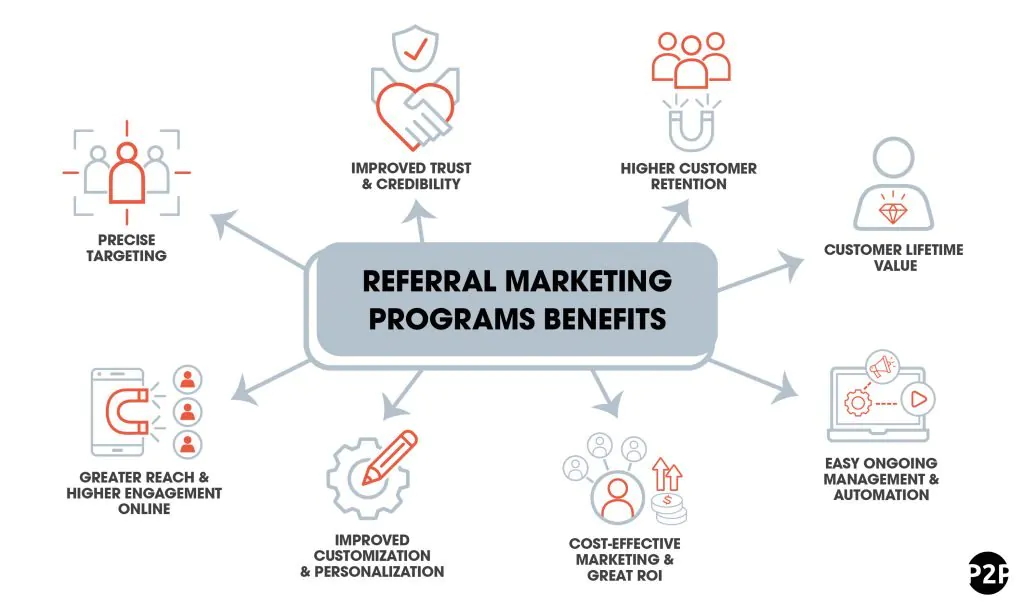
A referral marketing strategy is the foundation of your referral marketing program and sets out your aims and objectives, your goals, the incentives you will use, and how you will measure your progress along the way.
Based on some of the most well-known and successful referral marketing programs, the following steps will help you develop a robust strategy:
1. Set Clear Goals and Objectives: determine what you’re aiming to achieve. Set out which objectives are most important to you and how you will measure your success with the data you gather from your program.
2. Identify Any Existing Referral Sources: identify which customers are already advocating for you. They should be the first ones you contact when you launch your program and are the most likely to be your best brand advocates in the beginning.
3. Plan How You Will Let People Know About Your Program: work out how you will communicate your program to existing and new customers. Choose the right time and means of communication for the best results. Make sure your referral program is highly visible on your website.
4. Determine Your Referral Incentives and Structure: consider the incentives your customers will value most and how you’re able to provide them in the long-term. Choose the structure that will work best for your business and support your main goals and objectives.
5. Plan How You Will Run and Manage Your Program: select the software you will use and who will manage it. It is important to have this in place from the beginning so that you can plan how to scale it as the program grows.
6. Inform Your Customers and Get Them Onboard: This is implementing what you planned in step 3. Make sure you do this part well to make the most of this initial interest and get the momentum going.
7. Start Tracking and Measuring Your Referral Program: to run a successful referral marketing program, you need to keep track of it closely. What you measure and how you measure it will be informed by your goals and objectives. The essential metrics to track are:
– Program Participation Rate
– Customer Referral Rate
– Impression Rate
– Response Rate
– Conversion Rate
Tracking metrics allows you to see which aspects are working, which need attention, and which are your best successes. A great strategy is designed to evolve over time, taking into consideration the feedback from your tracking, so that you’re continually improving and getting the most from your investment.
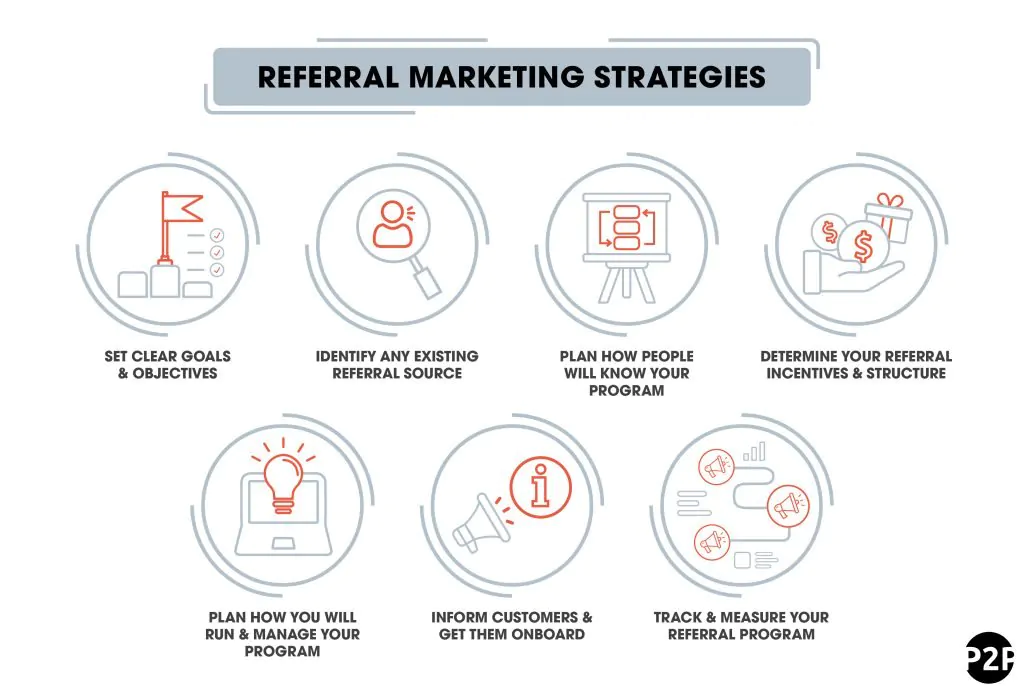
Check our full guide about referral marketing strategies
Referral marketing programs are unique to each business but they have been around for a long time and there is no need to reinvent the wheel when it comes to the incentives you can offer.
There are many different incentives you can use, depending on the size and nature of your business. These are some tried and tested ideas to consider:
1. Social Gifting – reward the friend they refer rather than the customer who made the referral
2. Free Cash – give the referring customer a cash bonus or incentive
3. Mystery Gift – a surprise gift that isn’t disclosed up until they receive it
4. Discounts on Subsequent Orders – a percentage or value amount off a future purchase
5. Charitable Donations – a donation in their name to a charity of their choice
6. Competitive Tiered Rewards – gamify the program and increase rewards as they move up
7. Referral Contest – organize a contest and only reward the winner with a substantial reward
8. Free Information – access to courses, workshops, or seminars/webinars
9. Subscription Credit – a free or discounted subscription to a product or service
10. Discounted Services – discounts or coupons for reduced rates on services
11. Upgraded Services – free upgrades to a more expensive plan or program
12. Free Goods and Services – Vouchers for a free product or service
13. Cash In-Purchase – coupons that they can use for discounts on certain products
When considering which incentives to use and how to manage them, it is also important to consider how visually attractive your program is and how it aligns with your brand, ease of use, and choice of software.
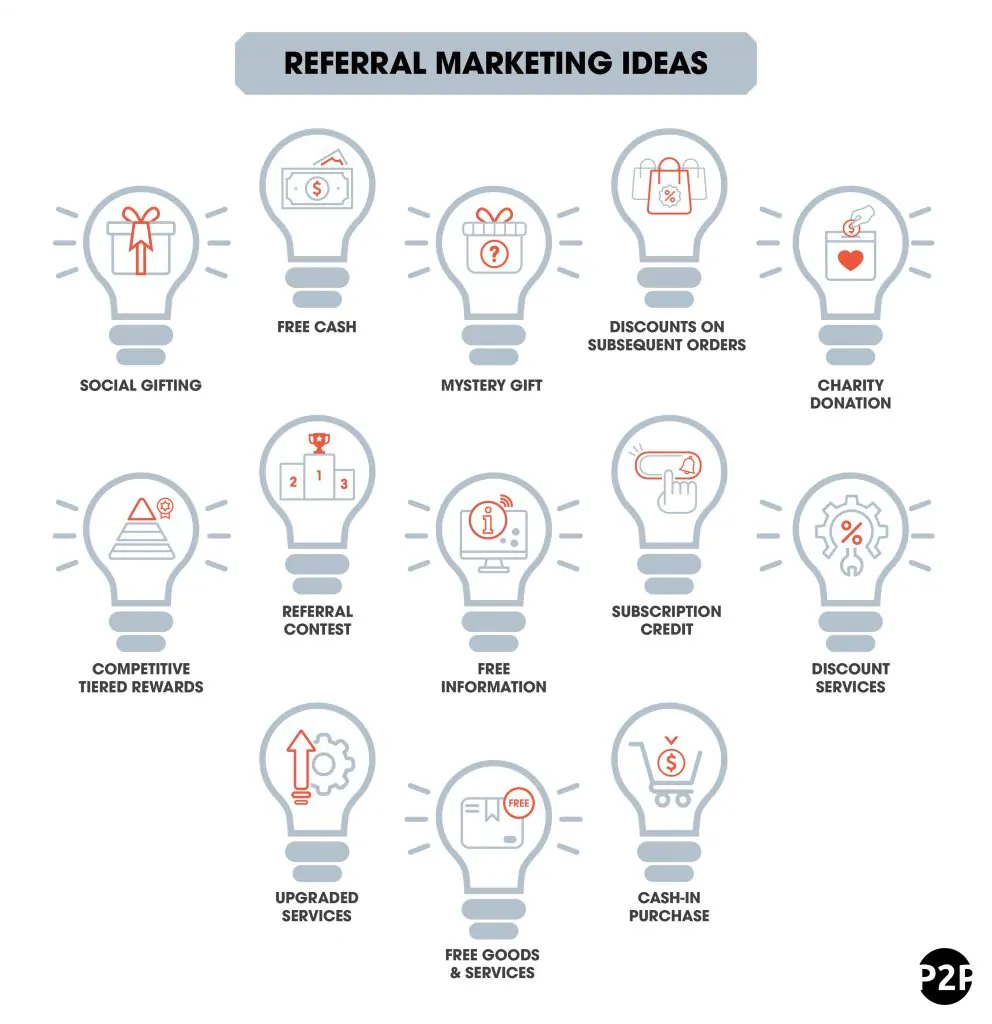
We’ve covered these 13 referral marketing ideas in this guide.
Some of the most successful referral marketing programs include Airbnb, Uber, PayPal, Tesla, and DropBox. These programs rapidly lead to massive growth and increases in revenue but they’re also on-going programs built to last.
Learning from these campaigns, these are the crucial aspects of a successful referral program:
– Understand your customers and evolve: Acknowledge the ever-changing trends and preferences amongst your consumers and modify your rewards accordingly.
– Customize your referral program: Most referral program software will offer countless styles, templates, fonts, and designs for you to make an attractive program that fits your brand.
– Choose the right referral program software: Opt for a solution that is known to create high-quality, attractive referral programs and offers all the functions you will need as you scale your program.
– Capitalize on happy moments: The best time to punt your referral program is when your customers are happy and satisfied with your brand.
– Market your program: make sure that everyone knows about your program!
– Be clear and concise: Keep it clear and simple. Make all information easy to access and understand.
– Make your rewards accessible: The best rewards are ones that users can access immediately.
– Thank your customers: Make your customers feel appreciated and acknowledged
– Keep your customers happy: happy customers make the best advocates for your brand.
– Be original: add your own twist to your program and make it stand out.
– Keep track: regularly measure your progress and ROI to make sure that your program is working optimally.-Establishing a good team with diverse talents as you would for customer marketing
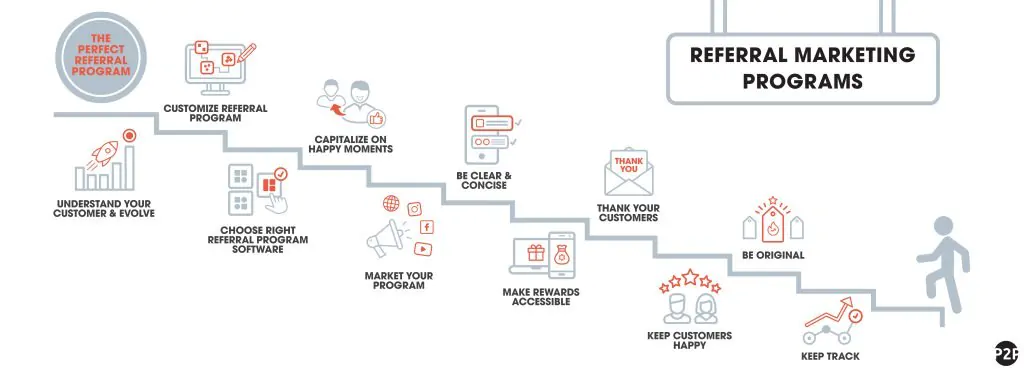
Learn more about the most successful referral programs and what you can do to make yours a success
A referral link is a URL (Uniform Resource Locator) that is allocated to a customer when they enroll in your referral program.
They share this link whenever they make a referral and the person they shared the link with uses it to access the website/offer.
Referral links are coded to be trackable and your referral program software will automatically trace the referral back to the customer who made the referral so that they can be rewarded.
Different programs will use different incentives for referrals, depending on the program and if they’re rewarding referrals made or only referrals that convert to a sale.
Referral Links vs. Referral Codes
A referral code is a subset of a referral link, which can be a common link for a particular campaign. The referral code is a unique identifier that enables tracking of the individual profiles within the campaign.
Like discount codes, a referral code is not a clickable link and is usually a short code that is entered by the referred customer when they sign up or make a purchase. The code enables the system to give them and the friend who referred them a reward/incentive.
Reasons to Use Referral Links
Referral links allow you to track the activity of each user and access valuable metrics like how many referrals they have made and how many of those referrals converted to a sale.
These valuable insights can be used to develop filtered sales funnels, marketing campaigns, and tailor-made products that suit various customer profiles.
They’re also the best and simplest way to direct referral traffic to the right landing page on your website. A direct link to the right place streamlines the process, allows for personalization and customization, and makes sharing and participating quick and easy.
Read about how referral links work in this guide
Your choice of referral marketing software can make or break your referral program. The software you choose will impact how user-friendly your program is, how attractive it is, the metrics you can track and the incentives you can offer.
It will also determine how much time, energy, and money you need to put into your program. This can have a profound impact on ROI and the long-term viability of a program.
How to Evaluate Referral Marketing Software
When evaluating your options, these are things to look for:
– Industry-specific software solutions
– Integration capabilities
– Omnichannel support
– Capacity and scalability
– Flexibility and customization
– User segmentation and targeting capabilities
– Analytics and reporting capabilities
– Customer support
– APIs and data usage rights
– Types of incentives supported
Taking these into consideration, you should look for the best software options for your needs. It is best to start with well-established, reputable, and recognized options. To make it easier, we have reviewed the best referral marketing software solutions for you.
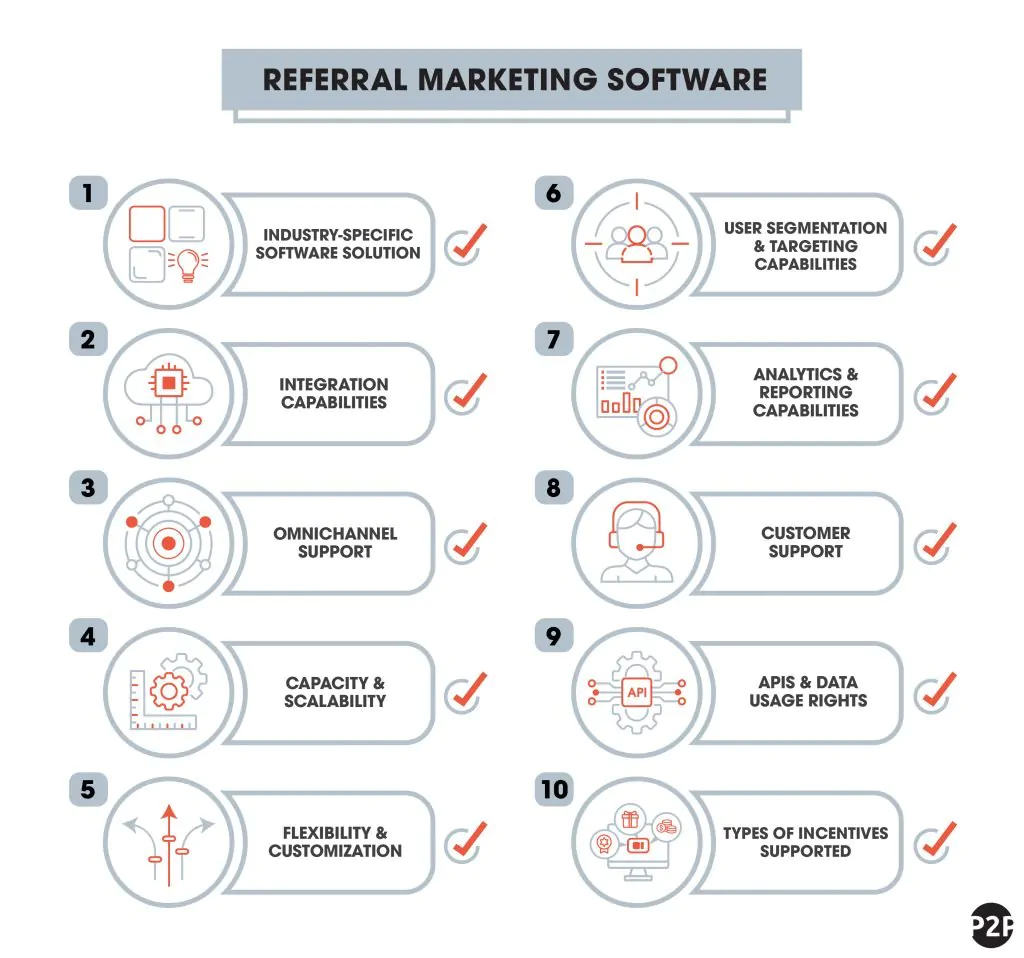
Check our full review of the best referral marketing software for E-Commerce and SaaS
Developing and implementing a successful referral marketing program can be a complex and challenging undertaking!
To make it easier, we set out the most important things to consider in this guide:
– Developing a referral marketing strategy
– Referral marketing ideas to inspire your own program
– The best referral marketing programs that others have used and the key lessons we can learn from them
– How referral links work and why to use them
– The importance of referral marketing software, how to choose the right software, and a selection of the best options to choose from
With the information, we have outlined here and in-depth articles for more detail, you have everything you need to start your successful program today!
Referral marketing is when customers refer their friends or family to a business through word of mouth, rather than the business using traditional advertising to attract customers. A formalized referral marketing strategy provides an incentive for customers to refer their friends. These include discounts on future purchases, gifts, early access to sales or access to a higher tier on a loyalty program. Read the full guide for a more detailed definition of referral marketing. The many benefits of referral marketing include: Five of the brands with the most successful referral programs (evaluated by consumer growth, increased conversions, and securing customer loyalty) are Airbnb, Uber, PayPal, Tesla, and Dropbox. Read the full guide to find out what these brands did, what they achieved, and how you can learn from them. Referral marketing software refers to the software solutions used to create, implement and manage a referral marketing program. They focus on automating the word-of-mouth marketing approach, which makes effectively managing and accurately tracking a referral marketing strategy possible. For more details, be sure to check out our full guide and complete list of the best referral marketing software.Frequently Asked Questions
What is referral marketing?
What are the benefits of referral marketing?
Improved Targeting, Trust, and Credibility
Higher Customer Retention and Customer Lifetime Value
Greater Reach and Higher Engagement Online
Increased Brand Awareness and Recognition
Easy Customization and Personalization
Cost-Effective Marketing and great ROI
Easy Ongoing Management and Automation
Check out the full guide for more detail on the great benefits of referral marketing.What are the best examples of referral marketing programs?
What is referral marketing software?

We created P2P to provide free resources to brands that believe in the power of peers to promote their service or products.
© 2019 P2P Marketing All Rights Reserved.